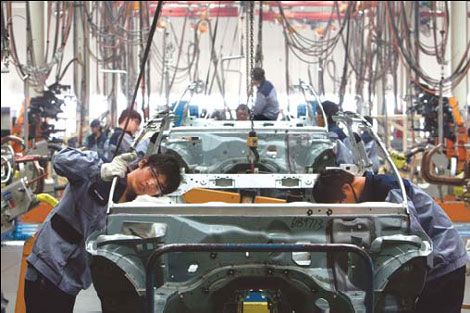Steering a new course
Updated: 2011-12-09 08:10
By Li Fangfang (China Daily)
|
|||||||||||
|
Workers at an assembly line of Daimler's plant in Beijing, where the first Mercedes-Benz E300 L automobile was made in May 2010. The E300 L is the first model that Daimler developed specifically for the Chinese market. [Photo / Provided to China Daily] |
German automaker Daimler AG considers China its second home as it is the only other global market where it is present across the entire automobile spectrum with its products.
"On reflection, Daimler's growth and development in China over the last few years has been above and beyond our expectations," said Ulrich Walker, chairman and chief executive officer of Daimler Northeast Asia. "All of these have happened thanks to the surging local automotive market and strong economy after China's WTO entry in 2001."
Daimler's track record has been quite impressive in recent years, particularly in China, where the company's business has gained strong momentum, in all directions.
The German automaker's business in China includes passenger cars - ranging from the compact Smart to the most luxurious sedan - vans, trucks, financing and spare parts.
In line with its growth, Daimler has also deepened its cooperation with China, and gained significant business advances in the past 10 years. Daimler Northeast Asia's annual revenue surged from 1.6 billion euros ($2.15 billion) in 2006 to 10 billion euros last year.
From 2008, its passenger vehicle unit, Mercedes-Benz, has been the fastest- growing luxury car brand in China for three consecutive years, and it is the first company to have brought its entire product lineup to the Chinese market.
Daimler is also the first automaker to have established an auto financing company for both passenger cars and commercial vehicles, as well as being the first to set up a research and development (R&D) joint venture with a local partner in the electric vehicle sector.
"Since its establishment in China, Daimler Northeast Asia has accumulated a long list of milestones and achievements, particularly so within the past 10 years after China's entry to the WTO, which have seen an enormous momentum of growth," said Walker.
For the next few years, Walker said the main tasks are to further deepen Daimler's cooperation with its local partners through joint ventures, expand product portfolio and further enhance the Mercedes-Benz brand image.
Walker said he is optimistic about Daimler's future in China, as well as the country's automotive market as a whole, since he has confidence in China's robust economy and business environment. "It is certainly a market in which to succeed, not just survive."
"The overall automobile market will continue to grow considerably, which is especially true for the premium market, therefore there is great potential for sales of our vehicles in the future - in fact we expect China to be our biggest global market by 2015," said Walker. "This is feasible, as China is one of the most important economies in the world and has a relatively low car density."
In 2010, amid a boom in the local market, Mercedes-Benz witnessed a surge in business, reporting year-on-year growth of 115 percent, following record sales of 147,670 passenger vehicles. It has maintained its strong growth momentum during the first three quarters of 2011 through sales of 139,400 units, an increase of 38 percent.
This is an impressive figure when considering that the overall market in China has cooled sharply to a growth rate of just 4 percent.
Walker said that Daimler's future success will, to a large extent, be based on local production of both passenger cars and commercial vehicles. This is why, as he said, "we have started to strengthen our cooperation with Chinese partners through a series of investments, preparing for the future development of local production covering all our business units".
Last year, the company announced that it will be investing 3 billion euros over the next few years together with its partners, marking Daimler's biggest investment in an overseas market.
In addition to ramping up current local production, Daimler will use this massive investment to enhance its rich and diverse premium product portfolio. The company will also expand its extensive dealership network, promote local R&D, and increase its corporate social responsibility investments, to not only enrich the brand but also benefit the Chinese society.
The company plans to gradually increase the proportion of its locally produced passenger cars to 70 percent by 2015 from the current 30 percent. By then China is expected to be Mercedes-Benz's largest market, with annual sales of 300,000 cars.
Related Stories
Mercedes-Benz sees higher China's sales growth in Sept 2011-10-18 15:53
New Daimler-BYD EV platform to debut next April 2011-10-18 14:13
Mercedes' 'Perfect dream car' for young elite in China 2011-07-18 11:26
Mercedes opens global design center in Beijing 2011-07-22 10:48
- Chinese shares close lower after data release
- Passengers prepare for annual peak
- Home appliance sales in rural China up 66% in Nov
- Collective wage talks promoted
- Good things in store for Chinese life insurers
- Dotcom could fall into disuse
- Global supermarkets conquer China
- China's Nov CPI up 4.2%, PPI up 2.7%









